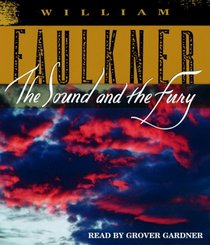I'd not read any Faulkner prior to picking up The Sound and the Fury, and I must admit that I was a bit apprehensive about this book. But I was also looking forward to getting some Faulkner under my belt, and this was my book group's selection, so I had added incentive. The metanarrative of this book is the decline of an old southern family in a tale told by three brothers: one disabled, one suicidal, one horrible. All of the brothers are obsessed with their sister Caddy, and their three narratives explain their lives through their thoughts of and interactions with their sister. Caddy's own decline, in the form of an affair and resulting pregnancy, fundamentally shapes the life of all the family members. Each member of the Compson household is afflicted in one way or another, and these afflictions collectively bring the family into a downward tailspin. I enjoyed reading this book, though it's difficult for me to explain exactly what makes it a classic. It might be the beautiful prose, it might be the deep complexity of the story, it might be the investment the reader must make in getting through it. While I'm certainly aware of Faulkner's importance to the modernist movement and his place in the literary canon, it's something else that makes this classic literature for me. I did think that Faulkner's evocation of the New South was masterful, and for those who've not studied the history of the New South, this is an excellent snapshot. By the time I'd reached the final section of the book I wanted to devour it all in one sitting. I'll be exploring more of Faulkner's canon in the years to come.
It is a masterpiece of American literature whose reading requires a watchful relinquishment of the spirit of skeptical criticism, if this is possible. The alert reader must follow the arc of the story with a vigilant but not logical mind since logic is not so helpful; because the explanations are not presented directly, systematically, the process of revealing is gradual, the information follows an order based on each character, not a chronological or other logical order. The sections on Jason and Dilsey are highly clarifying and by the end most of the pieces have fallen into their place - if the reader reads it all twice. Then even the flow of Benjy's stream of consciousness in the notorious first part seems to possess a beguiling clarity and simplicity, there is no difficulty, the arc of story is clear, there are no extra screws lying around, everything is locked together. As to Faulkner's notorious difficulty: Nothing good comes easy.
Of all the books Faulkner wrote the one he thought most highly in later years was The Sound and the Fury. Here he portrays with startling realism the lives of some of the most famous characters in American literature, the Compson family. Most critics agree that this stunning narrative of the dissolution of the Compson family is one the most remarkable novels of the 20th century.
I'd like to define this masterpiece of American literature not so much as a reading, a text like many other novels, masterpieces and not, but as a total reading experience. Immersive, like hiking in cloud. The impression left by the last page, when the tough alert reader comes to an end, is that bittersweet feeling of a goodbye in which mixed feelings simmer. First, feel the great relief for having finished it - reading it the first time is really difficult; second, amazement that Faulkner could represent reality in such a way as to settle in a reader's emotional landscape, with just words. Only words.
Time and shadows are the key words in this masterpiece of American literature, which has to be read twice, one after the other, the first time to get a fix on identity of the characters and the second to take in the evolution of the narrative. The identity of the characters is anxiously doubtful: they do not know themselves and they can never remain the same person through time. They struggle to live an integrated life alongside the people around them, yet it is a challenge given past and present, truth and lies, tragedy and comedy coexist and have to be reconciled once in a blue moon. âLife's but a walking shadowâ, from Shakespearean Macbeth, is the key here.
Fantastic classic!!! Must read!!!




